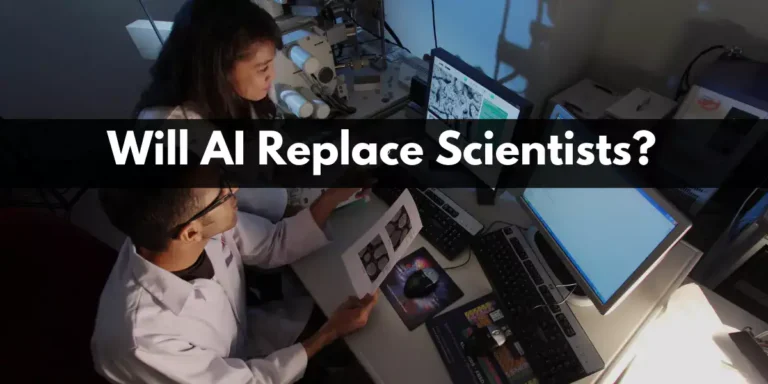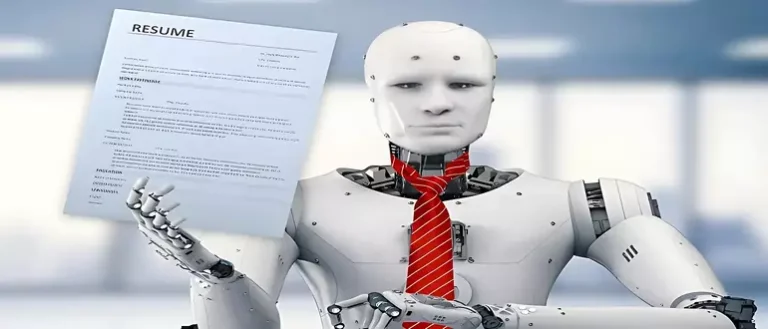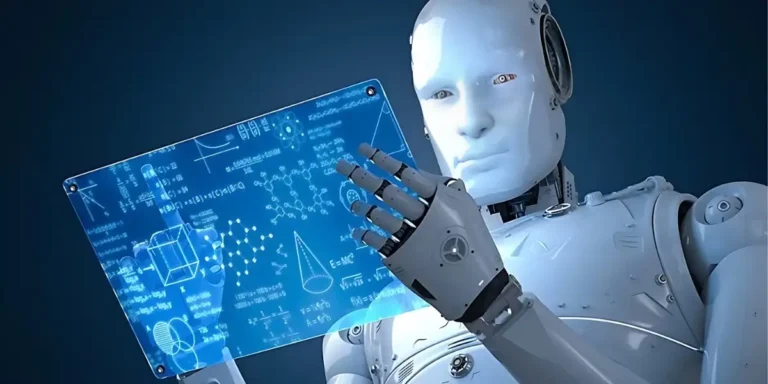In the rapidly evolving field of technology, the question on every developer’s mind is whether artificial intelligence (AI) will eventually replace the role of a full-stack developer.
While AI has made significant strides in automating various tasks, the skills and expertise of a full-stack developer cannot be completely replicated by AI.
In this blog post, we’ll delve into the topic to understand the following:
- the potential impact of AI on full-stack development,
- what new opportunities will arise in this sector,
- what types of skills should I develop as a full-stack developer
- the benefit and drawbacks of AI in this sector.

Will AI Replace Full-Stack Developer?
No, AI may automate certain repetitive tasks, such as testing and debugging, but it cannot replace the creativity, intuition, and critical thinking that full-stack developers bring to the table.
Full-stack developers have a wide range of skills and responsibilities that are difficult to replicate using AI.
It is unlikely that AI will completely replace full-stack developers anytime soon.
What Is The Impact Of AI On The Job Market For Full-Stack Developers?
In the case of full-stack developers, AI could potentially impact the skills and roles required for the job.
For example, as AI technology advances, it could automate some aspects of software development, such as code analysis and testing.
This could mean that developers would need to focus on more complex tasks, such as designing and implementing AI algorithms or integrating AI technologies into software systems.
This shift could also require developers to learn new programming languages, tools, and frameworks that are relevant to AI development.
Overall, while the specific impact of AI on the job market for full-stack developers is unclear, it is important for developers to stay up-to-date with the latest advancements in AI and related technologies to remain competitive in the job market.
What New Opportunities Will Arise For Full-Stack Developers With The Integration Of AI Technology?

Development of Intelligent Applications:
One of the most significant opportunities for full-stack developers is in the development of intelligent applications.
AI has made it possible to create software applications that can learn and adapt to changing environments.
Full-Stack developers with a good understanding of AI can leverage this technology to develop intelligent applications that can provide more personalized and relevant experiences to users.
For example, the development of chatbots that can answer customer queries in real-time or recommendation systems that can provide users with personalized content based on their preferences.
Increased Demand for Machine Learning Expertise:
With the integration of AI, the demand for machine learning expertise has increased significantly.
Machine learning is a subset of AI that involves the creation of algorithms that can learn and make predictions based on data.
Full-Stack developers with a good understanding of machine learning algorithms can create intelligent systems that can process large amounts of data and make predictions based on that data.
For example, a full-stack developer could create a system that analyzes customer data to provide personalized recommendations for products or services.
Improved Data Management:
Another opportunity for full-stack developers with the integration of AI technology is in the area of data management.
With the large amounts of data generated by AI applications, it is important to have systems in place to manage and analyze that data effectively.
Full-Stack developers can use their skills to develop efficient data management systems that can handle large amounts of data and provide insights based on that data.
For example, a full-stack developer could develop a system that analyzes customer data to provide insights into customer behavior and preferences.
Integration of AI into Existing Applications:
Full-Stack developers can also capitalize on the integration of AI into existing applications.
Many companies have existing applications that could benefit from the integration of AI technology. Full-Stack developers can use their skills to integrate
AI into these applications, thereby making them more intelligent and providing more value to users.
For example, a full-stack developer could integrate AI into a supply chain management application to optimize inventory levels and reduce costs.
Development of AI Frameworks:
Finally, full-stack developers can also play a significant role in the development of AI frameworks.
AI frameworks are tools that developers can use to build intelligent applications quickly and efficiently.
Full-Stack developers with a good understanding of AI can contribute to the development of these frameworks, thereby making it easier for other developers to create intelligent applications.
For example, a full-stack developer could contribute to the development of an AI framework that makes it easier to build chatbots.
How Can Full-Stack Developers Stay Ahead Of The Curve With The Rise Of AI Technology?

Learn the basics of AI technology.
To stay ahead of the curve, you need to have a basic understanding of AI technology.
This includes knowing the different types of AI, such as supervised and unsupervised learning, as well as the common AI algorithms, such as decision trees and neural networks.
By understanding the basics of AI technology, you’ll be better equipped to integrate it into your projects and keep up with the latest AI trends and developments.
Learn AI Programming Languages and Tools
To leverage AI technology, full-stack developers need to learn AI programming languages and tools.
Some of the popular AI programming languages include Python, R, and Java. Developers should also learn.
AI tools such as TensorFlow, Keras, and PyTorch. These tools provide an easy-to-use interface for building, training, and deploying AI models.
Keep up with the latest AI trends and developments.
AI technology is constantly evolving, and new trends and developments are emerging all the time.
To stay ahead of the curve, it’s important to stay up to date with the latest AI news and developments.
This includes following AI blogs, attending AI conferences and events, and keeping an eye on the latest AI research papers and publications.
By staying informed about the latest AI trends and developments, you’ll be able to incorporate them into your projects and stay ahead of the competition.
Learn how to integrate AI technology into your projects.
As a full-stack developer, it’s important to learn how to integrate AI technology into your projects.
This includes knowing how to use AI frameworks and libraries, such as TensorFlow and PyTorch, as well as knowing how to train and test AI models.
By learning how to integrate AI technology into your projects, you’ll be able to create more advanced and intelligent applications that can provide better user experiences and solve more complex problems.
Collaborate with AI specialists.
AI technology is complex, and it’s not always easy for full-stack developers to keep up with the latest AI trends and developments.
To stay ahead of the curve, it’s important to collaborate with AI specialists and experts.
This includes working with data scientists, machine learning engineers, and other AI professionals who can provide insights and guidance on how to integrate AI technology into your projects.
By collaborating with AI specialists, you’ll be able to stay up to date with the latest AI trends and developments and create more advanced and intelligent applications.
Develop your soft skills.
As a full-stack developer, it’s not just about technical skills. To stay ahead of the curve with the rise of AI technology, it’s also important to develop your soft skills.
This includes communication skills, problem-solving skills, and teamwork skills.
By developing your soft skills, you’ll be able to work more effectively with AI specialists and other team members and create better applications that can meet the needs of your clients and customers.
Build AI Models
Full-stack developers can build AI models to solve business problems.
For example, they can use machine learning algorithms to identify fraudulent transactions or to recommend products to customers.
They can also use natural language processing (NLP) algorithms to analyze customer feedback and improve their products and services.
Use AI to Automate Tasks
AI can help full-stack developers automate repetitive tasks. For example, they can use AI-powered chatbots to handle customer queries or to automate testing processes.
By automating these tasks, developers can save time and focus on more complex tasks.
Leverage AI Analytics
AI can also provide developers with insights into their data. By leveraging AI analytics, full-stack developers can identify patterns in their data and make data-driven decisions.
For example, they can use predictive analytics to forecast sales or to identify areas for improvement in their products and services.
What Are The Benefits Of Using AI Technology In Full-Stack Development?

Faster software development
AI is a tool that can be used to speed up the software development process. AI-enabled tools can write code quickly, handle debugging, and fix errors in real time.
For example, AI can automate routine tasks such as writing boilerplate code, freeing up developers’ time to focus on other, more important tasks.
Improved accuracy
AI-enabled tools can improve the accuracy of software applications. AI can help developers identify bugs and vulnerabilities that could impact the application’s functionality.
This leads to better software quality and a higher level of user satisfaction.
Furthermore, AI can help identify potential problems before they occur, reducing the likelihood of application crashes.
Simplified and automated tasks
AI can simplify and automate tasks, making them less tedious and more efficient.
AI-enabled tools can identify patterns in data and automate routine tasks such as testing and deployment.
This reduces the chances of human error and frees up developers’ time to focus on other, more important tasks.
Enhanced user experience
AI can help developers create software applications that offer a better user experience.
For example, AI can help identify user behavior patterns and personalize the application’s interface accordingly.
This leads to a better user experience and a higher level of user satisfaction.
Cost-effective
AI can help developers create software applications that are more cost-effective.
AI-enabled tools can automate tasks and optimize resource utilization, reducing costs and speeding up development cycles.
Furthermore, full-stack developers are able to do everything from design to implementation, which is less expensive for businesses.
Therefore, businesses prefer hiring full-stack developers instead of front-end and back-end developers.
What Are The Drawbacks Of Using AI Technology In Full-Stack Development?
Costly implementation:
Implementing AI technology in full-stack development can be quite costly, requiring significant investment in both hardware and software.
Additionally, training developers to use AI tools effectively can also add to the cost.
Potential human job loss:
One of the most significant concerns regarding the use of AI technology is the potential loss of jobs for human developers.
As AI tools become more sophisticated, they may be able to replace human developers in certain tasks, which could lead to job loss and significant changes in the job market.
Lack of emotion and creativity:
AI tools can automate many tasks, but they lack the ability to add creativity and emotion to their work.
Human developers are still needed to bring a creative and emotional touch to the work, which can be difficult for AI to replicate.
FAQs
Can AI Aid Full-Stack Developers?
Yes, AI can aid Full-Stack Developers by automating repetitive tasks such as testing and debugging, providing code suggestions, and improving the speed and accuracy of code creation.
This can free up developers to focus on more complex tasks that require creativity and problem-solving skills.
Will Full-Stack Development Change With The Integration Of AI?
Yes, Full-Stack Development will change with the integration of AI.
Developers will have to adapt to new tools and technologies, and new roles may emerge that require expertise in AI and machine learning.
However, Full-Stack Development will continue to require a range of skills beyond the capabilities of AI, including creativity, communication, and critical thinking.
Should Full-Stack Developers Learn About AI?
Yes, Full-Stack Developers should learn about AI to remain competitive in the tech industry.
As AI technology continues to advance, developers who can integrate it into their work and understand its applications will have an advantage.
Conclusion
AI has advanced in software development, although it is unlikely to replace full-stack developers.
AI can enhance efficiency and help with specific activities, but it cannot replace human ingenuity and problem-solving.
Full-stack engineers can do front-end and back-end programming, making them beneficial to any company.
Thus, full-stack developers will be necessary for many years.





